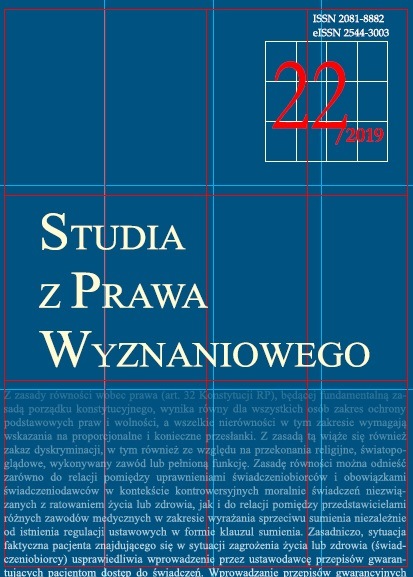Szczegółowe lub kompleksowe zasady ochrony danych osobowych stosowane przed wejściem w życie RODO na przykładzie Kościoła Ewangelicko-Augsburskiego w RP
Detailed or comprehensive rules for the protection of personal data before the entry into force of the GDPR on the example of the Evangelical Church of the Augsburg Confession in Poland
Author(s): Michał HucałSubject(s): Law, Constitution, Jurisprudence, Human Rights and Humanitarian Law, Canon Law / Church Law
Published by: Katolicki Uniwersytet Lubelski Jana Pawła II - Wydział Prawa, Prawa Kanonicznego i Administracji
Keywords: personal data protection; Evangelical Church of the Augsburg Confession; GDPR; churches and other religious organizations; detailed rules; comprehensive rules;ochrona danych osobowych; RODO
Summary/Abstract: Regulation (EU) 2016/679 of the European Parliament and of the Council of 27 April 2016 on the protection of natural persons with regard to the processing of personal data and on the free movement of such data, (General Data Protection Regulation, henceforth: GDPR) has a much greater impact on churches and other religious organizations than the previously applicable Directive 95/46/EC of the European Parliament and of the Council of 24 October 1995 on the protection of persons with regard to the processing of personal data and the free movement of such data, implemented into the Polish legal order in the form of the Act of 29 August 1997 on the protection of personal data. In accordance with Article 91 para. 1 GDPR, churches and other religious organizations which at the time of entry into force of the Regulation, i.e. on 24 May 2016, applied comprehensive rules for the protection of individuals with regard to the processing of data may continue to apply them if they have been adapted to the GDPR.However, comparison of the Polish version of Article 91 GDPR with its English equivalent gives rise to serious doubts. Instead of the adjective “kompleksowy”, which seems to be a more accurate equivalent of “comprehensive” occurring in the English text, the term “szczegółowy” [detailed] is used. As a consequence, in the current law of the European Union states, two different terms are applied in the same contexts, depending on the language: “detailed rules” or “comprehensive rules”. In this situation, uniform application of law is a difficult task.The present article also provides a detailed analysis of the provisions for the protection of personal data adopted in the legal order of the Evangelical Church of the Augsburg Confession in Poland. The provisions under discussion serve as an example of the regulations followed by churches and other religious organizations before the introduction of the GDPR. The choice of the Evangelical Church of the Augsburg Confession is motivated by the fact that it is one of the biggest churches in Poland and its relations with the state – as in the case of 14 other religious organizations – are defined by a separate act.
Journal: Studia z Prawa Wyznaniowego
- Issue Year: 2019
- Issue No: 22
- Page Range: 255-288
- Page Count: 34
- Language: Polish

